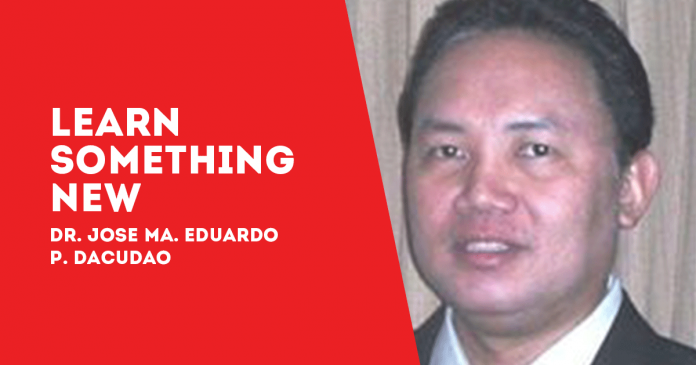
BY DR. JOSE MA. EDUARDO P. DACUDAO
WE HAVE to acknowledge that the makers of a Constitution are human and humans have made and could make mistakes, such as creating an impossible-to-fulfill legal provision.
Faced with such reality, the only real honest and fair solution is to acknowledge such fact, instead of wasting millions trying to create such an impossible artificial language.
These millions of pesos wasted on the “Filipino” book and media industries come from the taxes of all Filipinos, including non-Tagalogs, yet these taxes are being used in endeavors that favor only Tagalog and that culturally harm the other languages.
From the contextual perspective above, the Tagalog industry has become one malignant gigantic racket and scam, protected by compromised or downright corrupted individuals (especially in government institutions involved in defining, propagandizing, writing, broadcasting, and disseminating “Filipino”) who socially or financially benefit from it.
One obvious recommendation of this essay is for a Constitutional Amendment that would clearly mandate a Multiple Official Languages model in the Philippines, in the spirit of respecting and preserving our traditional indigenous languages and the ethno-linguistic peoples that they define.
This means deleting all enforced Tagalog subjects from all school curriculums, and replacing them with two or three Philippine language electives. Students will have the right to choose which two or three (or more) Philippine languages to learn.
A Tagalog student in Metro Manila may opt to learn say Ilocano and Ilonggo. An Ilocano may choose to learn Tagalog and Kapampangan. A Kapampangan may choose to learn Naga Bicolano and Cebuano. A Cebuano may choose to learn Karay-a and Waray. And so on.
This is a good thing for the Tagalog people, as they will learn to respect and harmonize with other Philippine ethnic peoples, instead of arrogantly wondering why the heck do these provincianos resist speaking Tagalog in their own regions.
For non-Tagalogs, it would mean their very survival. (Freedom to choose will probably result in most students choosing Tagalog, Cebuano and/or Ilonggo, and those languages would then function as some kind of lingua franca for most of the Philippines in the near future. The big difference from the present is that then, students won’t have Tagalog rammed into their mouths, and they will have to freedom to choose.)
The prevailing international language of science, commerce, and diplomacy, which presently is English, shall remain an official language. An added benefit is that no ethnic Philippine people speaks English as its defining language, and so English functions as a sociologically levelling tongue.
In other words, if a non-Tagalog is forced by society’s mores to speak Tagalog in the presence of a Tagalog, he or she is relegated to an inferior social status, but this condition immediately disappears when both are speaking in English.
It’s not a farfetched idea; for 40 years this was the condition in Philippines from 1900 to 1940. For those that say it’s a bad thing, we may have been economically better off in that era than we are now.
Therefore, what they are saying is based solely on an ideology that has been conditioned into them by the educational system and mass media, even if historical facts have already shown that there is nothing intrinsically wrong with using English as a lingua franca in the Philippines as it was before World War 2.
For more information on the phenomenon of the levelling tongue, it’s known that the usage of French as a levelling tongue in equatorial African countries has saved some of the minorities from extinction, because they were and are not forced to speak the language of the tribe in social majority in their area. (To be continued)/PN


